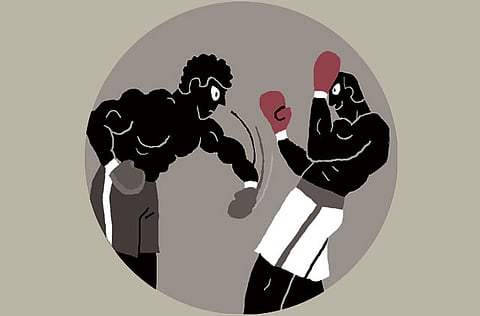What Obama could learn from Ali
The boxing champion's ‘rope-a-dope' technique is a nice metaphor for an effective strategy for great power competition

How many of you know what the phrase ‘rope-a-dope' means? For those who don't, the phrase describes the strategy that Muhammad Ali used to defeat the heavily favoured George Foreman in their heavyweight championship fight in Zaire in 1974, the so-called "Rumble in the Jungle."
Foreman had demolished former champ Joe Frazier in two rounds in a previous bout, and most observers expected him to make short work of the older and smaller Ali. But Ali had prepared a clever strategy, and he spent the early rounds of the fight covering up and leaning against the ropes. Foreman landed lots of ineffectual blows, punched himself out, and became exhausted.
Ali came off the ropes and knocked Foreman out in the 8th round. What, you ask, does any of this have to do with international politics? The ‘rope-a-dope' is a nice metaphor for an effective strategy for great power competition, somewhat analogous to the strategy of ‘bait and bleed.'
During the Cold War, for example, it made good sense for the United States to let the Soviet Union waste blood and treasure trying to win meaningless victories in places like Angola, or Afghanistan. By the same logic, Soviet leaders were smart to let Americans fight for years in Vietnam. In both cases the outcome of these conflicts didn't really matter very much to the overall balance of power, so letting the opponents punch themselves out trying to win was a clever approach.
Today, one could argue that China is employing the ‘rope-a-dope' against the US. And like poor Foreman, America is falling for it. It gets the honour of pouring money and lives into fruitless state-building projects like the current Afghan war, while China concentrates on building a stronger economy, gradually reforming its political order, and cultivating good working relations with other countries.
Remaining bogged down in Central Asia or distracted by Iran also diverts it from focusing more attention on China, and makes it less likely to do some overdue ‘nation-building' at home. If the US was smarter, of course, it would be looking to saddle potential rivals with a lot of expensive order-keeping activities, and let them bear the burden in difficult or intractable local conflicts. That would give foreign policy elites less to do, perhaps, but that might not be such a bad thing either.
Case in point: Why not let China worry about Pakistan's future, and get itself embroiled trying to manage the various quarrels and blood feuds in Central Asia? They could hardly do a worse job than the US has, and it would probably end up with a better relationship with most of the region.
Strategic areas
It is astonishing how much more popular the US might be if it played hard-to-get more often, so that others would be less resentful of our constant sermonising and interfering. Heck, if it stood aloof more often, some states would quickly do a lot more to try to make sure the US didn't forget about them. One caveat: The key to the ‘rope-a-dope' strategy was Ali's ability to prevent Foreman from landing telling blows in places that did matter.
To make it work in international politics, the US would gain a clear sense of which areas were strategically vital and which didn't matter.
And it would also have to be able to distinguish between areas where it is useful to retain a lot of influence, and places where its main interest is simply to prevent some hostile power from dominating.
This task wouldn't always be easy, but it shouldn't be impossible either. It does require a significant mental adjustment, however, back to a focus on the US national interest instead of vague and idealist notions about spreading its ‘values' and creating an American-centred ‘world order.'
American leaders have to stop thinking that the whole world is their responsibility and stop deluding themselves into thinking that the US can and should "pay any price and bear any burden." From a purely American perspective, letting allies bear more of the burden in key regions and encouraging adversaries to blunder into sinkholes and quagmires makes a lot more sense.
— Washington Post
Stephen M. Walt is the Robert and Rene Belfer professor of international relations at Harvard University.


